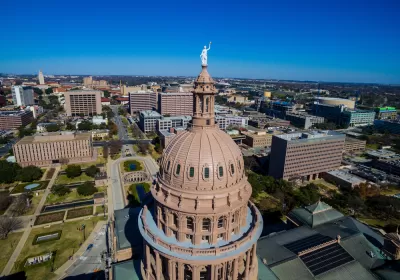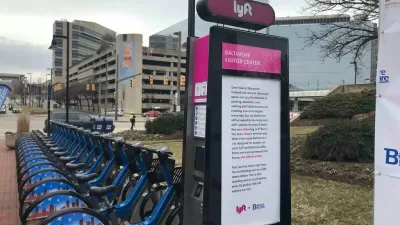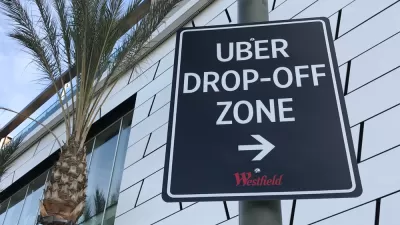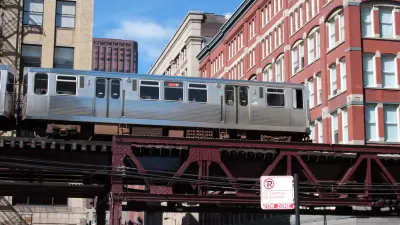A new Texas state law that regulates transportation network companies also overrides more restrictive local regulations, like Austin's requirement for fingerprinting drivers. Austin voters supported the tighter regulations at the ballot box last May.

On Memorial Day, Gov. Greg Abbott signed House Bill 100, which effectively ends the ban on ride-hailing enacted by the Austin City Council in December 2015 and supported by voters in May 2016.
Uber and Lyft put restrictions such as finger print requirements to a ballot test on May 7, 2016 with Proposition 1, but 56 percent of voters rejected the measure to overturn the regulations. The two companies suspended service in the city the following morning. [See Planetizen: "Op-Ed: Why Uber Wasn't Welcome in Austin."]
HB 100 "will override local provisions and provide regulatory certainty, creating a consistent framework across the state for popular ride-hailing companies, while still enforcing important customer safety standards," states the governor's office on the bill signing.
"It requires ride-hailing companies to have a permit from the Texas Department of Licensing and Regulation [TDLR] and pay an annual fee of $5,000 to operate throughout the state," reports Alex Samuels for The Texas Tribune. "It also calls for companies to perform local, state and national criminal background checks on drivers annually — but doesn't require drivers to be fingerprinted."
According to the department's FAQs on Transportation Network Companies (TNCs), they anticipate "publishing rules for the TNC program in the Texas Register on July 28, 2017, and adopting rules no later than September 29, 2017. Based on this timeline, we expect the TNC rules to take effect on November 1, 2017."
However, the ride-hailing companies need not wait for the publication of the rules. "Uber and Lyft said they resumed operations in Austin on Monday," adds Samuels. "Lyft also said it would relaunch in Houston on Wednesday (Uber is already operating in Houston.)"
FULL STORY: Uber, Lyft return to Austin as Texas Gov. Abbott signs ride-hailing measure into law

Planetizen Federal Action Tracker
A weekly monitor of how Trump’s orders and actions are impacting planners and planning in America.

San Francisco's School District Spent $105M To Build Affordable Housing for Teachers — And That's Just the Beginning
SFUSD joins a growing list of school districts using their land holdings to address housing affordability challenges faced by their own employees.

The Tiny, Adorable $7,000 Car Turning Japan Onto EVs
The single seat Mibot charges from a regular plug as quickly as an iPad, and is about half the price of an average EV.

Seattle's Plan for Adopting Driverless Cars
Equity, safety, accessibility and affordability are front of mind as the city prepares for robotaxis and other autonomous vehicles.

As Trump Phases Out FEMA, Is It Time to Flee the Floodplains?
With less federal funding available for disaster relief efforts, the need to relocate at-risk communities is more urgent than ever.

With Protected Lanes, 460% More People Commute by Bike
For those needing more ammo, more data proving what we already knew is here.
Urban Design for Planners 1: Software Tools
This six-course series explores essential urban design concepts using open source software and equips planners with the tools they need to participate fully in the urban design process.
Planning for Universal Design
Learn the tools for implementing Universal Design in planning regulations.
Smith Gee Studio
City of Charlotte
City of Camden Redevelopment Agency
City of Astoria
Transportation Research & Education Center (TREC) at Portland State University
US High Speed Rail Association
City of Camden Redevelopment Agency
Municipality of Princeton (NJ)





























